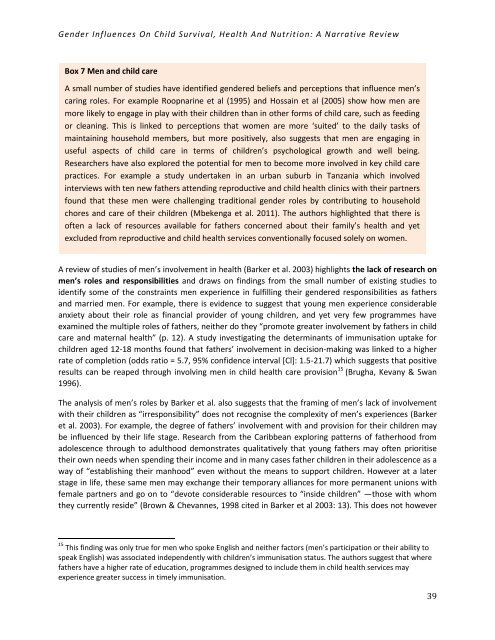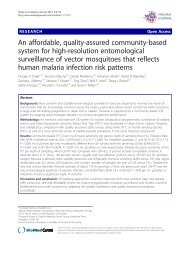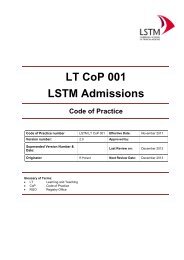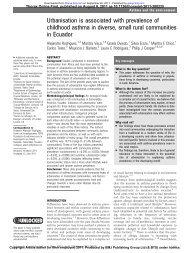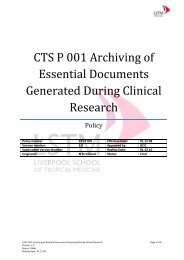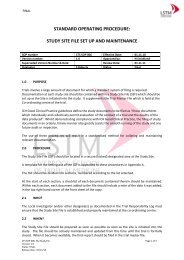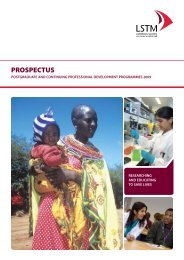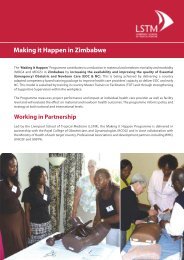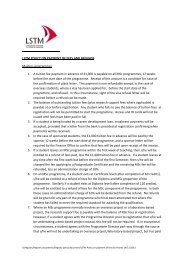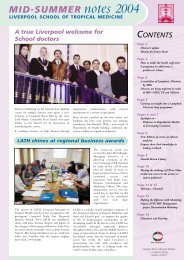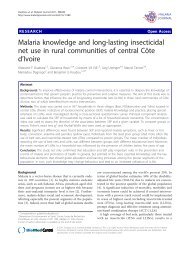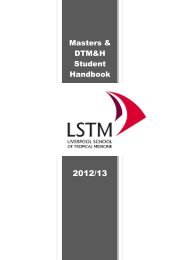Gender influences on child survival, health and nutrition: a ... - Unicef
Gender influences on child survival, health and nutrition: a ... - Unicef
Gender influences on child survival, health and nutrition: a ... - Unicef
Create successful ePaper yourself
Turn your PDF publications into a flip-book with our unique Google optimized e-Paper software.
<str<strong>on</strong>g>Gender</str<strong>on</strong>g> Influences On Child Survival, Health And Nutriti<strong>on</strong>: A Narrative Review<br />
Box 7 Men <strong>and</strong> <strong>child</strong> care<br />
A small number of studies have identified gendered beliefs <strong>and</strong> percepti<strong>on</strong>s that influence men’s<br />
caring roles. For example Roopnarine et al (1995) <strong>and</strong> Hossain et al (2005) show how men are<br />
more likely to engage in play with their <strong>child</strong>ren than in other forms of <strong>child</strong> care, such as feeding<br />
or cleaning. This is linked to percepti<strong>on</strong>s that women are more ‘suited’ to the daily tasks of<br />
maintaining household members, but more positively, also suggests that men are engaging in<br />
useful aspects of <strong>child</strong> care in terms of <strong>child</strong>ren’s psychological growth <strong>and</strong> well being.<br />
Researchers have also explored the potential for men to become more involved in key <strong>child</strong> care<br />
practices. For example a study undertaken in an urban suburb in Tanzania which involved<br />
interviews with ten new fathers attending reproductive <strong>and</strong> <strong>child</strong> <strong>health</strong> clinics with their partners<br />
found that these men were challenging traditi<strong>on</strong>al gender roles by c<strong>on</strong>tributing to household<br />
chores <strong>and</strong> care of their <strong>child</strong>ren (Mbekenga et al. 2011). The authors highlighted that there is<br />
often a lack of resources available for fathers c<strong>on</strong>cerned about their family’s <strong>health</strong> <strong>and</strong> yet<br />
excluded from reproductive <strong>and</strong> <strong>child</strong> <strong>health</strong> services c<strong>on</strong>venti<strong>on</strong>ally focused solely <strong>on</strong> women.<br />
A review of studies of men’s involvement in <strong>health</strong> (Barker et al. 2003) highlights the lack of research <strong>on</strong><br />
men’s roles <strong>and</strong> resp<strong>on</strong>sibilities <strong>and</strong> draws <strong>on</strong> findings from the small number of existing studies to<br />
identify some of the c<strong>on</strong>straints men experience in fulfilling their gendered resp<strong>on</strong>sibilities as fathers<br />
<strong>and</strong> married men. For example, there is evidence to suggest that young men experience c<strong>on</strong>siderable<br />
anxiety about their role as financial provider of young <strong>child</strong>ren, <strong>and</strong> yet very few programmes have<br />
examined the multiple roles of fathers, neither do they “promote greater involvement by fathers in <strong>child</strong><br />
care <strong>and</strong> maternal <strong>health</strong>” (p. 12). A study investigating the determinants of immunisati<strong>on</strong> uptake for<br />
<strong>child</strong>ren aged 12-18 m<strong>on</strong>ths found that fathers’ involvement in decisi<strong>on</strong>-making was linked to a higher<br />
rate of completi<strong>on</strong> (odds ratio = 5.7, 95% c<strong>on</strong>fidence interval [Cl]: 1.5-21.7) which suggests that positive<br />
results can be reaped through involving men in <strong>child</strong> <strong>health</strong> care provisi<strong>on</strong> 15 (Brugha, Kevany & Swan<br />
1996).<br />
The analysis of men’s roles by Barker et al. also suggests that the framing of men’s lack of involvement<br />
with their <strong>child</strong>ren as “irresp<strong>on</strong>sibility” does not recognise the complexity of men’s experiences (Barker<br />
et al. 2003). For example, the degree of fathers’ involvement with <strong>and</strong> provisi<strong>on</strong> for their <strong>child</strong>ren may<br />
be influenced by their life stage. Research from the Caribbean exploring patterns of fatherhood from<br />
adolescence through to adulthood dem<strong>on</strong>strates qualitatively that young fathers may often prioritise<br />
their own needs when spending their income <strong>and</strong> in many cases father <strong>child</strong>ren in their adolescence as a<br />
way of “establishing their manhood” even without the means to support <strong>child</strong>ren. However at a later<br />
stage in life, these same men may exchange their temporary alliances for more permanent uni<strong>on</strong>s with<br />
female partners <strong>and</strong> go <strong>on</strong> to “devote c<strong>on</strong>siderable resources to “inside <strong>child</strong>ren” —those with whom<br />
they currently reside” (Brown & Chevannes, 1998 cited in Barker et al 2003: 13). This does not however<br />
15 This finding was <strong>on</strong>ly true for men who spoke English <strong>and</strong> neither factors (men’s participati<strong>on</strong> or their ability to<br />
speak English) was associated independently with <strong>child</strong>ren’s immunisati<strong>on</strong> status. The authors suggest that where<br />
fathers have a higher rate of educati<strong>on</strong>, programmes designed to include them in <strong>child</strong> <strong>health</strong> services may<br />
experience greater success in timely immunisati<strong>on</strong>.<br />
39


